
To learn more check out our
Editorial Guidelines.
16 min read
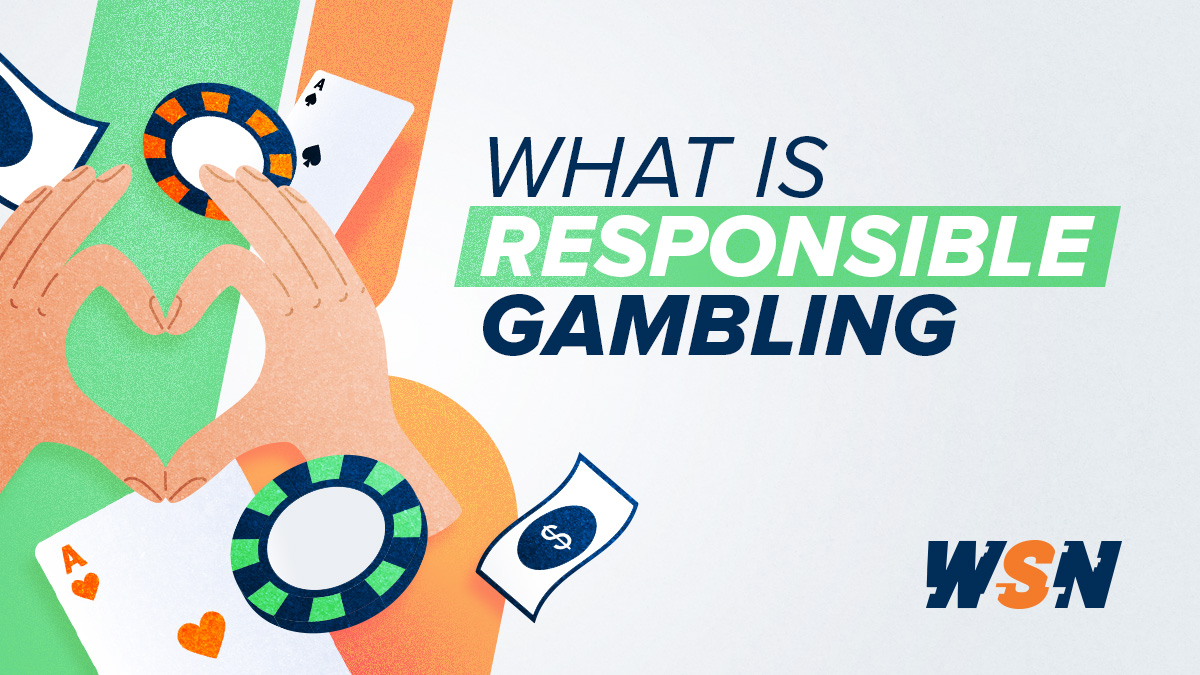
Responsible gambling is about understanding and enjoying all the different types of gambling, including sports betting, casino games, and online poker safely. However you gamble, your safety and enjoyment should be your priority, not winning money.
Gambling is a popular pastime enjoyed by millions of people worldwide. Safe gambling can be fun, but understanding the risks, including the risk of developing a problem with gambling, is an essential part of the deal.
On this page, we’re going deep on responsible gambling, why it's so important, and the tools and tips to help you gamble more responsibly. We'll also cover problem gambling and the state-specific helplines and organizations available for those struggling with gambling addiction.

Expert Opinion - Understanding Responsible Gambling
Responsible gambling encompasses more than just engaging in various forms of gambling safely; it involves a comprehensive understanding of the individual risks associated with each activity.
For instance, while enjoying sports betting via mobile phones from home, different strategies for responsible play are necessary compared to in-person casino gaming.
The dynamic nature of sports betting, coupled with the emotional involvement it often evokes, demands unique approaches to mitigate potential harm. Similarly, the immediacy and accessibility of online casino games present distinct challenges for maintaining responsible gambling habits.
Recognizing these nuances allows players to tailor their strategies accordingly, ensuring they can enjoy their favorite activities while minimizing the risk of developing problematic gambling behaviors. By understanding the scope of responsible gambling, individuals can make informed decisions and foster a safer gaming environment for themselves and others.
- Pat Eichner
Associate Partner at GMA Consulting
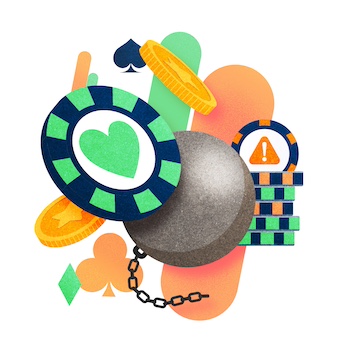 What’s the Difference Between Responsible Gambling and Problem Gambling?
What’s the Difference Between Responsible Gambling and Problem Gambling?Responsible gambling is a set of practices that helps you maintain a healthy and enjoyable relationship with gambling, while problem gambling describes the range of problems that can occur when you aren’t practicing responsible gambling.
Problem gambling can come in many forms and your gambling habits can easily impact other parts of your life, like your mental health or your financial situation. Gambling responsibly means these areas don’t suffer while you have fun, whereas problem gambling flips the script.
A cornerstone of responsible gambling is understanding and enjoying all types of gambling as a form of entertainment. This goes for casino games and poker, as well as sports betting, both on and offline. All of these activities should be fun, not a source of emotional or financial worries.
Responsible gambling is about ensuring that you gamble in a way that keeps you safe and in control while having fun. Problem gambling flourishes when you lose control and discipline, and the moment you realize you are not having fun should be a red flag.
Telltale signs of problem gambling include if you use gambling as a source of income or try to spend more money than you have. If your gambling becomes a problem, it can make your relationships suffer and seep into other parts of your life. It can enable you to neglect your responsibilities and lead to denial of the issues it creates.
Practicing responsible gambling is essential to ensure your gambling stays enjoyable and minimizes problem gambling risks. It’s important to practice responsible gambling every time you log in or visit your casino, to make it a mindful part of your relationship with gambling.
From a player’s perspective, practicing responsible gambling creates a safe, sustainable, and fun gambling experience. From the industry’s perspective, promoting responsible gambling is also crucial. It helps the industry maintain a positive reputation and prevent regulatory intervention. The healthier and happier everyone who gambles recreationally is, the better for everyone.
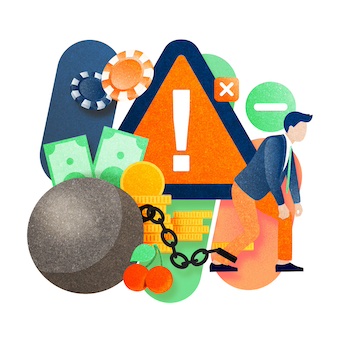 The Harms of Problem Gambling
The Harms of Problem GamblingRecreational gambling is a form of entertainments, but if it becomes problem gambling it can turn into a spiral of harm. It can affect many different parts of your life in different negative ways: mentally, physically, financially and socially.
First and foremost, understanding your individual needs and health is essential. If you are suffering from financial stress, emotional turmoil, or social isolation, it’s a sign you shouldn’t be gambling. This path can lead to anxiety and depression, and massively impact your mental health.
Problem gambling can impact your physical health. It may lead to sleep disturbances and poor eating habits due to stress. Gambling can also cause financial struggles such as debt, and, in extreme cases, job loss or bankruptcy. When you combine debt with problem gambling, the compulsion to chase losses can lead to spending more money to catch up. This is a dangerous spiral.
It affects your personal relationships, causing isolation from friends or family and a lack of desire to socialize or engage in other hobbies.
Recognizing the potential for these harms and integrating responsible practices is vital.
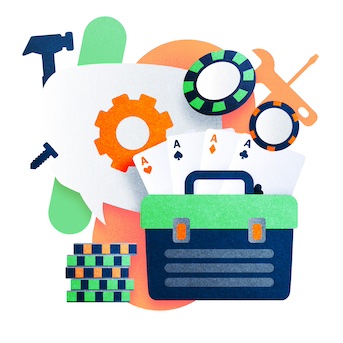 Quick Tips and Tools for Gamblers:
Quick Tips and Tools for Gamblers:For all players, whether you’re a seasoned gambler or just getting started, there are tools you can use to help you gamble more responsibly, both online and offline. Incorporating these tools can significantly impact your overall experience for the better and help you gamble more responsibly.
When gambling responsibly, taking regular breaks is essential. Sometimes, online casinos provide digital tools that can help you with this, but if not, it’s up to you to manage your time in a healthy way. For instance, you can turn on the mandatory play breaks setting. This interrupts long gambling sessions, forcing players to take a break. Reality checks are another useful service, where the casino notifies you to let you know how long you’ve been playing after a set period of time. It doesn’t lock your account, but keeps you informed and accountable for the time you’ve spent online.
You can also download responsible gambling apps such as Bettor Time to use while you play, which include prompts to take a break.
Betting limits are another way to have additional control and ensure you don't move into problem gambling. Setting yourself a limit or barrier prevents you from blowing your entire budget in one go and gambling more than you can afford to.
There are different ways to use betting limits. It could be a maximum bet per game, a daily deposit limit, or a loss limit. Limits help you gamble within your means and save you from impulsive decisions.
Lots of online casinos and sportsbooks provide tools or settings to control your limits, but it also may be necessary to manage your limits manually, using discipline and willpower.
For those who are seeing even mild issues with gambling, setting and sticking with limits is a vital first step toward recovery. Limiting your bets will break the cycle of chasing losses and compulsive play, providing structure and familiarity.
Alcohol and substance abuse and responsible gambling rarely go together. When drinking alcohol or taking other substances, the intoxicating effects can cloud your judgment and blur boundaries, which can lead to potentially harmful decisions.
It’s true that having a drink during a night out in a casino can be a fun part of the whole experience, but moderation is key.
If you are planning to go to the casino or gamble online, ensure that you have pre-planned your limits for drinking and gambling. Being aware of your intoxication levels helps maintain your control and stay focused on the game.
Self-exclusion means you voluntarily ban yourself from a casino or sportsbook, online or offline. It’s a somewhat more drastic step, and totally removes the ability to gamble and extracts yourself from the environment. Even if you want to gamble again, you won’t be able to. For land-based gambling in your area, you can also use state-wide schemes to request that you exclude yourself.
If you think that you are spending too much time or money on gambling, whether online or in in-person, self-exclusion might be the tool you need to use.
State-specific help lines and organizations are essential resources to provide localized advice and care for anyone struggling with gambling. The organizations are available 24/7 and staffed with trained professionals. They provide guidance, counseling, support groups, and referral services.
Not only are these a lifesaver for problem gamblers, but they provide an essential service for friends and family, too. If you know someone you think might have an issue but aren’t sure of the next steps, this is the perfect place to start.
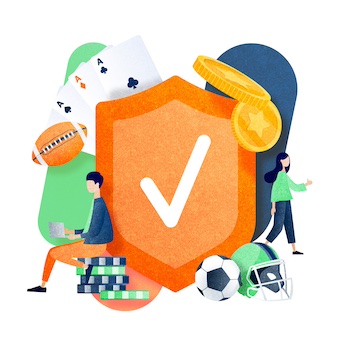 How Do Casinos and Sportsbooks Protect Gamblers?
How Do Casinos and Sportsbooks Protect Gamblers?Whether you gamble online or offline, responsible gambling messaging and resources must be available to all players. The licensed operators must provide the option of self-exclusion and other advice and tools for players to try to stop problem gambling.
As one of the main precautions for underage gambling, there are rigorous identity checks for anyone trying to gamble. Protecting vulnerable underage people is a priority, along with preventing online gambling sites from becoming a gateway for young people to more issues down the line. Here are some other ways casinos and sportsbooks protect gamblers:
Access to responsible gambling support: Gambling operators provide information and practical steps to help support the players. This includes helplines and referrals to external support and counseling services.
Self-assessment tests: Some casinos and sportsbooks will provide self-assessment tests to help players understand and evaluate their gambling habits. If players have gambling problems, they’ll be able to understand their situation better through the test.
Monitoring Player Behavior: Operators monitor player behavior for signs of problem gambling and when necessary, intervene. This includes erratic deposit and betting patterns. When triggered, the operators offer guidance or restrict access to certain games and features.
Customizable Deposit Limits, Reality Check notifications, and the other digital tools described above.

Expert Opinion - Global Perspectives
The US can learn a lot from overseas markets. Acknowledging different global perspectives enriches the discussion around responsible gambling. Diverse regulatory frameworks, cultural attitudes, and years of experience from mature gaming markets worldwide all affect the discussion. Varied regulatory models, from state monopolies to more liberalized open markets, offer different insights into tackling problem gambling.
Cultural norms influence gambling perceptions and behavior, necessitating culturally sensitive interventions. Mature gaming markets like the UK and Australia provide valuable lessons in harm minimization through public awareness campaigns and self-exclusion programs, and we have now seen jurisdictions like Ontario leverage these valuable lessons in recently banning the use of athletes in ads for online gambling, with the provincial regulator saying the move will “help safeguard children and youth.”
Understanding different approaches towards responsible gambling, whether government-led or industry-driven, allows countries – and in the case of the US, the jurisdictions within – to tailor strategies to their regulatory environments and societal needs. By leveraging global insights, stakeholders can choose their own best path toward safe and responsible gambling.
- Pat Eichner
Associate Partner at GMA Consulting
The reason that legal and licensed gambling operators provide the tools and protection described above is that they are required to do so by regulators and governing bodies. The specific regulations vary by state in the US (or by country around the world), but there are always responsible gambling measures written into the very law.
It starts from your very first interaction with the site, when the casino has to verify the age and identity of its users when they sign up - preventing underage people playing or anyone who is on a self-exclusion list. This is not just a morally correct action from the operator - it’s a legal requirement.
If you want to keep your gambling license, you have to reach certain standards designed to protect customers and encourage safe and responsible gambling.
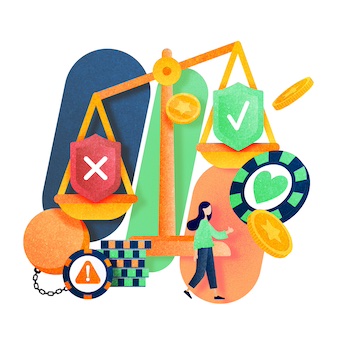 Responsible Gambling in Regulated vs. Unregulated Markets
Responsible Gambling in Regulated vs. Unregulated MarketsIt is much easier to practice responsible gambling in a regulated market - where your data and money are protected - compared with unregulated markets. Unregulated markets refer to sites that operate outside legal jurisdictions without gambling licenses or regulatory oversight. In regulated markets, online gambling operators must implement strict KYC (know your customer) procedures.
This includes verifying their customers' identity through various means, including ID checks and address verification. This helps prevent minors from accessing gambling sites. It also ensures that online gambling sites can identify problem gamblers and offer them help.
In regulated markets, operators must provide information on problem gambling helplines and organizations as part of their legal responsibilities. This includes prominently displaying links and messaging on their websites.
For the unregulated casinos, depending on the site, they may not have any requirements for providing information on problem gambling, such as helplines and support services. In some cases, this means that players may not have access to crucial tools to help manage their problem gambling.
Basically, in an unregulated market, gambling sites are not compelled to promote responsible gambling, while this very much is the case with legal and regulated gambling sites.
Gambling in the US has become much safer since more states have rolled out legal and regulated online gambling. While in the past unregulated gambling operators could behave as they pleased, now each individual state gambling commission is responsible for the wellbeing of the players in their respective states.
There have been several milestones in the journey to safer gambling in the US. The 20th century was a turbulent time for gambling in the US, with laws changing rapidly state by state. In 1992, the Professional and Amateur Sports Protection Act was passed, meaning sports betting and most types of online gambling was made illegal in almost every state in the US. With the rise of the internet, this created flourishing black and gray gambling markets, with US bettors accessing unregulated offshore websites.
Meanwhile, legal in-person casinos continued to create new regulations to protect players. In 1995, Nevada (which was excluded from PASPA) introduced the concept of self-exclusion programs. In 1999, Caesars became the first company to provide a strict nationwide self-exclusion option.
A huge moment came when the Supreme Court overturned PASPA in 2018, meaning more states could legalize and regulate sports betting. This has led to a massive increase in the number of legal online gambling options for players. As each state legislates for online gambling, they include consumer protection measures as part of their respective industries, from self-exclusion to data protection laws.
As illegal and unregulated gambling becomes less popular in the US, players enjoy more protection.
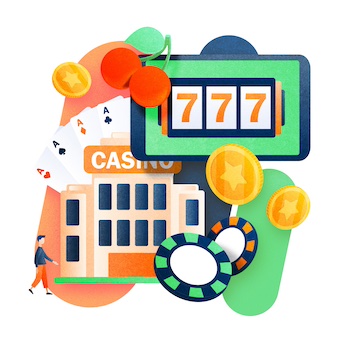 Differences Between Gambling Online vs. Brick and Mortar Casinos
Differences Between Gambling Online vs. Brick and Mortar CasinosGambling responsibly can look a little different, depending on whether you are playing online or at a real casino.
Brick-and-mortar casinos are a more social and interactive experience, altogether more high energy and excitement. It can mean you get carried away easily, lose your inhibitions and lose track of things like your bankroll. The ready availability of alcohol (including for free in some cases) is another big hindrance to responsible gambling and needs to be managed carefully.
Playing online is a more solitary experience, which has its own challenges. It can foster feelings of isolation or helplessness, out of the public eye. The easy access of online casinos, available 24/7 in the palm of your hand, can also be challenging for anyone struggling with compulsive gambling.
Despite the different environments between online and live gambling, all the responsible gambling best practices described on this page are important for both.
https://www.unlv.edu/news/article/what-responsible-gambling-interview-jennifer-shatley
https://problemgambling.az.gov/treatment-counseling/signs-and-symptoms
https://www.algamus.org/blog/8-signs-your-loved-one-has-a-gambling-problem
https://www.camh.ca/en/health-info/mental-illness-and-addiction-index/problem-gambling
https://www.helpguide.org/articles/addictions/gambling-addiction-and-problem-gambling.htm
https://casino.betmgm.com/en/blog/online-casino-games-how-often-should-you-take-breaks/
https://www.algamus.org/blog/be-aware-know-the-signs-of-a-gambling-addiction
https://www.alcoholhelp.com/2022/11/15/the-connection-between-alcohol-and-gambling-addiction/
Responsible Gambling Center: Helping You Gamble Safely
1 year ago | Pat Eichner/fit-in/400x235/1713863942/feature-responsible-gambling-tools.jpg)
Responsible Gambling Tools and Resources
1 year ago | Pat Eichner/fit-in/400x235/1713865152/feature-guide-to-resp-gambling-in-marketing.jpg)
Guide to Responsible Gambling in Marketing
1 year ago | Pat Eichner
We support responsible gambling. Gambling can be addictive, please play responsibly. If you need help, call
1-800-Gambler.
WSN.com is managed by Gentoo Media. Unless declared otherwise, all of the visible content on this site, such
as texts and images, including the brand name and logo, belongs to Innovation Labs Limited (a Gentoo Media
company) - Company Registration Number C44130, VAT ID: MT18874732, @GIG Beach Triq id-Dragunara, St.
Julians, STJ3148, Malta.
Advertising Disclosure: WSN.com contains links to partner websites. When a visitor to our website clicks on
one of these links and makes a purchase at a partner site, World Sports Network is paid a commission.
Copyright © 2025